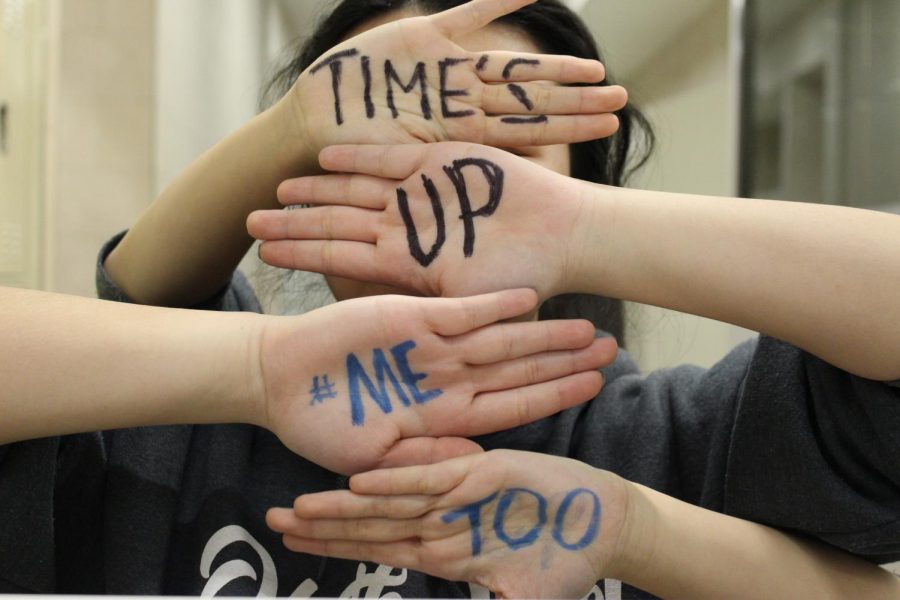Unequal Times
February 24, 2018
In mid-October of 2017, the sexual harassment awareness movement, #MeToo, was popularized by actress Alyssa Milano. It was created in 2006 by women’s rights activist Tarana Burke. Milano addressed the Harvey Weinstein allegations and encouraged those who have been sexually assaulted/harassed to come forward with the hashtag MeToo on Twitter.
#MeToo is aimed at helping rape and sexual harassment/assault victims come forward with their experiences and receive help, as well as bring conversations about these topics into light. While the main advocates are women, the movements still need support and communication from men.
Students have been working towards familiarizing themselves with the movement and have their own voices on the matter.
“People need to recognize that we need men in this movement and that men and women need to work together to get anything accomplished,” said Freshman Macy Glover. “The #MeToo movement is really important because the main goal of it is to get people to listen to women that aren’t always listened to or believed.”
The TIME’S UP movement was a byproduct of the #MeToo movement. TIME’S UP was created on January 1st of 2018 and is slightly different than #MeToo According to the TIME’S UP Now website, “… TIME’S UP addresses the systemic inequality and injustice in the workplace that have kept underrepresented groups from reaching their full potential.”
TIME’S UP is another equality movement that students have been working towards understanding. The movements embody their own thought processes and help them understand/shape their opinions. Along with #MeToo, they have their own voices on the TIME’S UP movement.
“They should know the difference between men and women’s salaries and what women are feeling in the workplace, and then what men are feeling in the workplace,” said freshman Allison Bryan. “We can then compare them and see how we can make it where both women and men feel the same and are treated the same. The goal is not to look at gender but just how well the work is done.”
TIME’S UP addresses not only sexual harassment in the workplace, but also the long-debated wage gap.
“The wage gap is the difference in pay that men and women make for doing the same work with equal performance,” said freshman Matt Bice. “[Many people] don’t want to admit there is a problem in society that we need to fix. It’s been a societal thing for so long they don’t want to change it, or refuse to admit it’s there.”
Inequality in the workplace is not uncommon and has been improving. According to the International Labour Organization, in 1979, women in America earned about 62 percent of what men were paid. As of 2011, women in America earned 81 percent of what men made. However, women aren’t the only people workplace inequalities impact, and some believe that addressing these issues is overdue.
“[Inequality in the workplace is] something that we should have in the past by now, especially with all the advances we are making in race issues and stuff like that,” said freshmen Mckenzie Gordon. “Even though there are struggles with that, we should be enforcing this more as well.”
Understanding why people are unequal in the first place can help in fighting against it. Bice and Gordon agreed that a combination of old societal standards/normalities and years of passed down discrimination contributed to this divide.
The TIME’S UP and #MeToo movements are primarily online, and most students have found them from social media. There are almost 1.2 million posts under the hashtags on Instagram combined, with hundreds more added each day.
Many have seen the importance of these movements, and their impact on society, and advocate for teaching about equality movements in school.
“We are high schoolers,” said freshman Emma Johnson. “We are getting ready to go out into the world, and to do this — and who knows what’s gonna happen — I feel like we should all be educated on it, even if it is just a little bit.”
Education on these subject matters is important to pushing new change. It helps people understand what’s going on around them and become more comfortable with these topics. It will also help people understand that everyone, not just women, can be victims of these abuses/harassments.
“Men get sexually abused too,” said Glover. “A man could speak up and say ‘me too.’ This starts with education about the movement and making it a more comfortable subject for everyone to talk about.”
Supporters and followers of these movements hope the people who have stayed silent will see others come forward and speak up as well.
“It’s important… because women are finally speaking out as a whole, and [it] sparks a chain reaction as one woman speaks out, the other one feels empowered and has enough courage to speak out as well,” said freshmen Paige Snider.
However, in order for these movements to be successful, people need to be empathetic towards the victim.
“The most important thing is making sure victims don’t feel ashamed and that the predators do, the victims shouldn’t be ashamed for that,” said freshman Cache Goracke. “A lot of times, people don’t tell others because they are scared that it will reflect poorly on them, or they’re embarrassed.”
In school, if people work towards an equal environment, it can help fight back against stereotypes and inequalities later on.
“Stereotypes have been in place for a really long time and people don’t want to accept anything else, making it hard for everybody to be equal,” said freshman Erin Stenson. “In the U.S. we’re lucky we are required to go to school, we need to use it to teach kids, at a young age, that everybody is equal.”
Sources:
https://www.timesupnow.com/
http://www.ilo.org/washington/areas/gender-equality-in-the-workplace/WCMS_159496/lang–en/index.htm

